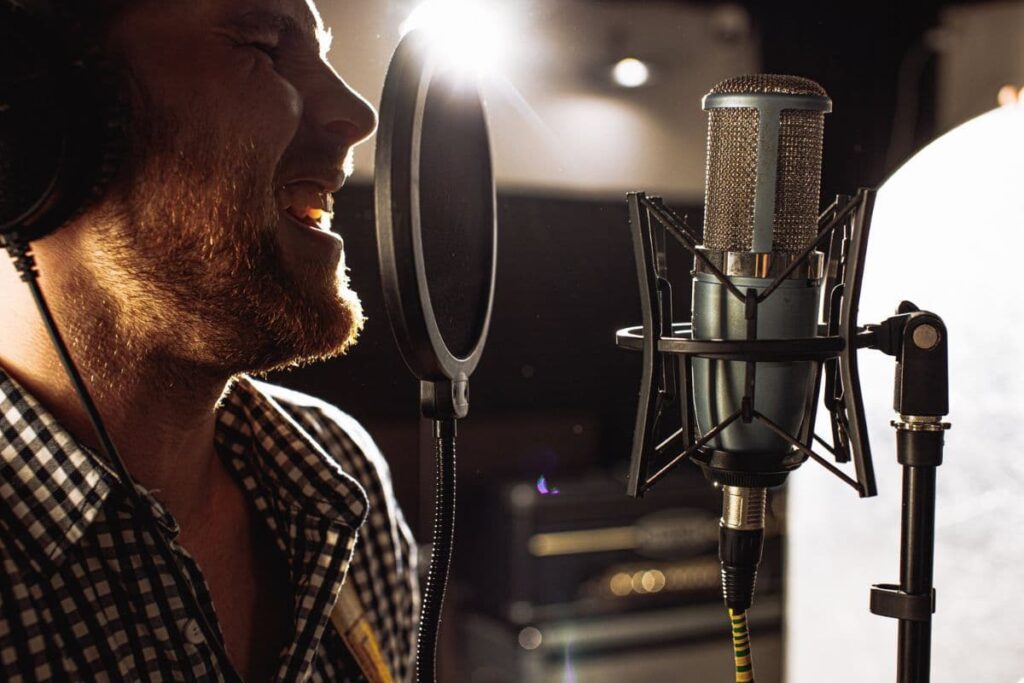Picture this: You’ve just decided to face your fears and get on the stage for karaoke. Your heart is pounding as the audience stares at you, but you think, “I’m not that bad of a singer, right?” Unfortunately, when your voice transfers through the speakers, you’re embarrassed.
You sing worse with a microphone because you aren’t used to hearing your voice as it sounds, as is the case for most people. Microphones provide a way for us to hear accurately; it can be jarring to hear your voice as others hear it.
Let’s take a few minutes to dive into how our voices and sound vibrations work and find out why your voice seems terrible every time you pick up a mic.
Table of Contents
- Why Your Voice Sounds Wrong When Singing With a Mic
- How We Hear Our Voice Versus How Others Hear Us
- How Microphones Work
- Other Factors To Consider When Singing Through a Microphone
- Conclusion

Why Your Voice Sounds Wrong When Singing With a Mic
Sound is nothing more than vibrations passing through the air. When we speak, our vocal cords vibrate, creating waves that bounce around inside our skulls, hitting tissue and bone.
Sound comes out differently depending on what the vibrations have interacted with on their way to your brain. When soundwaves bounce around inside your skull, they produce a deeper bass sound, which is often richer in tone.
This is the voice we hear whenever we speak and, thus, how we perceive ourselves to sound to others.
It can be a shock when we hear ourselves on a recording or through a microphone. This is because instead of the sound only going through multiple channels to reach our inner ear, it bounces off various objects and travels through the air.
This means that our voices sound completely different to other people on recordings and through microphones. Often, the speaker feels like their voice is coming out significantly higher pitched and weaker when hearing it through any medium other than normal speech.
How We Hear Our Voice Versus How Others Hear Us
When sound travels from our vocal cords to our inner ear, we hear it through two mediums: internal conduction and external conduction. Our skulls, tissues, and ligaments provide excellent acoustics to perceive our voices. As a result, our voices often sound great to us.
That is until we hear a recording and are left shocked. The main difference lies in what the sound waves come in contact with before they’re perceived and interpreted by your inner ear. Other people only hear your voice through the external conductors, so they’re missing all that richness you hear.
While it may be difficult to believe there’s a difference between hearing inside your head versus outside, it’s pretty clear that such a difference exists. Ask anyone who’s ever had the cringeworthy experience of hearing themselves on a recording.
How Microphones Work
Microphones function as a tool that converts sound waves into audio signals. They take the input (in this case, your voice) and send it out slightly differently.
There are multiple types of microphones; each one takes in sound and converts it differently. Some microphones take in sound from all sides, often portraying your voice more accurately.
Some only take in sounds from the front and back; when you move the mic a bit too far to one side or the other, your voice becomes distorted.
Is My Microphone Voice Also My Real Voice?
So, you might be wondering which is your real voice: the voice you hear through the microphone or the voice you hear when you speak normally. Here’s the short answer: it depends on the microphone.
If you are singing through a high-quality mic that picks up the full range of your voice, then the answer is a resounding yes.
On the other hand, lower-quality microphones don’t always give the best picture of our voice. However, in general, even if the microphone isn’t the highest quality, the representation of your voice through it is still significantly closer to what you sound like to other people than what you hear in your head.
If you want to learn more, I recommend the detailed guide I’ve put together about when and how microphones can change your voice. Do Microphones Change the Way Your Voice Sounds?
Check out this video for a run-down on your voice through a microphone and how to sound your best.
Other Factors To Consider When Singing Through a Microphone
Your voice may sound worse through a microphone for a variety of reasons. Although the primary reason is often simply that we aren’t used to hearing our voice outside of our heads, a couple of other factors can influence how you sound when singing through a microphone.
You Don’t Have Added Effects
In today’s world, we are all used to hearing the made-up and marked-up versions of songs. The songs we hear have all kinds of acoustic effects added to them.
Occasionally, people get the idea that when they sing through a microphone, it should sound like a song that’s already been through a thorough editing process. It’s important to remember that what you hear through a mic is just you—without any added effects.
I know this can add to the embarrassment in some ways, but it’s also an opportunity to recognize how others hear you and learn to improve your voice. After all, we can’t improve on something we don’t know the true sound of.
You Have a Poor Microphone Technique
The reality is that microphones are just fickle instruments. Holding the microphone too far to one side or the other, too close to your mouth, and so on can cause significant distortion in what you hear as the final result.
If the microphone is held too far away from your mouth, it can cause your voice to sound thin. If it’s held too close, your voice will sound extra heavy and thick.
If the microphone is held too far away from your mouth, it can cause your voice to sound thin. If it’s held too close, your voice will sound extra heavy and thick.
The key is to figure out the perfect angle and then sing your heart out. Remember, practice makes perfect.
If your recording quality suddenly drops, you may have a problem with your microphone. I’ve covered the potential causes and solutions in my guide. Microphone Quality Suddenly Bad? How to Fix It
Conclusion
Why do you sing worse with a microphone? The truth is, you don’t. You sing in your true voice. You just aren’t accustomed to hearing that voice. Other factors, like the lack of editing and poor microphone technique, can also influence how your voice sounds through a microphone.
If you want to develop your singing skills, one of the best things you can do is sing through a high-quality microphone and record yourself more often.
- Review of the ALABS IRON MINI-WL: A Powerhouse Wireless Microphone - October 4, 2023
- What is a Saturator in Music Production: A Brief Explanation - May 11, 2023
- What Are Rotary DJ Mixers? An Overview - May 11, 2023
SoundStudiomagic.com is a participant in the Amazon Services LLC Associates Program, an affiliate advertising program designed to provide a means for sites to earn advertising fees by advertising and linking to Amazon.com. We also participate in other affiliate programs which compensate us for referring traffic.

